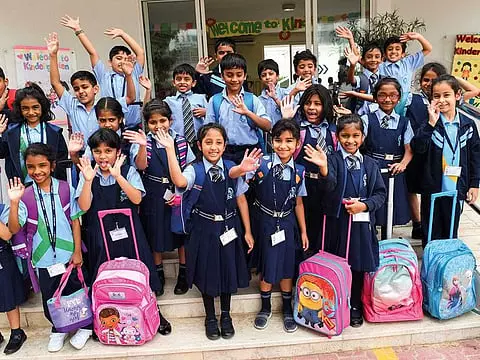
Dubai mandates Arabic for children under 6 in private schools, Indian institutions
text_fieldsDubai’s Knowledge and Human Development Authority (KHDA) has introduced a new policy requiring all private schools and early childhood centres, including Indian institutions, to provide Arabic education for children up to six years old. This initiative, aimed at strengthening Arabic language skills from an early age, will take effect in September 2025 for schools that follow a September academic calendar and in April 2026 for those operating on an April schedule.
The phased implementation will begin in September 2025 with children aged four to six, eventually expanding to include all children from birth to six years old. The policy is part of Dubai’s broader Education 33 strategy and falls under the Loughat Al Daad initiative, which seeks to promote Arabic proficiency and cultural awareness among students.
To ensure effective learning, KHDA has outlined key instructional strategies that emphasize engagement and cultural relevance. These include:
- Allocating one-third of instructional time to Arabic language teachers.
- Introducing play-based and inquiry-driven teaching methods.
- Adopting diverse teaching models suited for both native and non-native Arabic speakers.
- Encouraging interactive and culturally enriched learning activities.
KHDA has identified two essential factors for the success of this initiative:
- Teachers must have appropriate qualifications and participate in ongoing professional development.
- Parents should actively support Arabic learning at home to reinforce language skills.
Fatma Belrehif, CEO of the Education Quality Assurance Agency at KHDA, emphasized that instilling a love for Arabic from an early age ensures that all children, whether Emirati, Arab, or non-native speakers, can fully integrate into the UAE’s linguistic and cultural landscape.
Alongside this initiative, KHDA has also updated requirements for teaching national mandatory subjects such as Arabic, Islamic Education, Social Studies and Moral Education for students from Grade 1/Year 2 to Grade 12/Year 13 in Dubai’s private schools. The updates include increasing instructional time and modifying the language of instruction for Arabic-speaking students in Islamic Education, Social Studies and Arabic. Additionally, changes have been made to UAE Social, Moral, and Cultural Studies for non-Arab students.
These reforms underscore Dubai’s commitment to preserving and promoting Arabic language and culture while ensuring a high-quality educational experience for all students in the emirate.






















